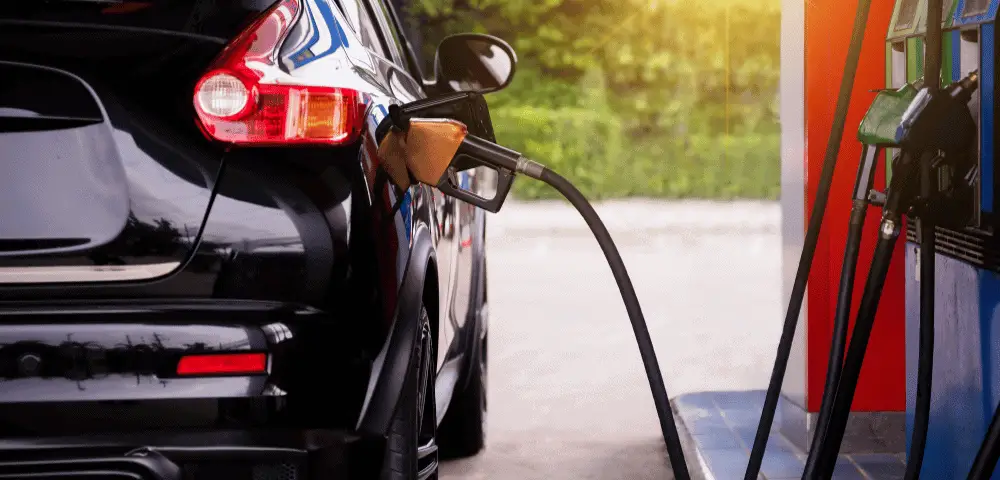You’ve had suspicions about the fuel pump being faulty. However, you aren’t quite sure that it’s the culprit; not unless it stops working completely.
So what kind of signs should you watch out for if the fuel pump is defective? Just how does a car act when the fuel pump is going out?
For one, its engine will start sputtering. The car may also start losing power abruptly and the fuel tank may produce a weird noise. In worst-case scenarios, the engine may not start at all.
For a more detailed explanation, check out the post below.
What Does A Fuel Pump Do?
A fuel pump is designed to do exactly what its name implies: pumping fuel from the fuel tank to the engine.
However, the mechanics involved in this process are a bit more complicated than that. Here’s a breakdown of what takes place:
- Drawing fuel through a line – as you’ll learn later in the article, there are different kinds of fuel pumps. If your car uses an electric pump, then it’s likely driven by a minute-sized motor that draws fuel from the tank through the line and into the engine.
In older vehicles though, you’ll likely find a mechanical fuel pump that operates slightly differently. This pump moves concurrently with a spinning camshaft – an action that allows the fuel to be drawn using suction.
- Fuel reaches the carburetor or engine cylinder – when fuel leaves the gas tank, it travels via a fuel line to reach either the carburetor or engine cylinder. Engine systems have different compositions. So depending on the parts involved, the fuel may end up directly in the cylinder or take a detour elsewhere.
- Air and fuel mixture and combustion – in cars that have a carburetor, this is essentially the combustion chamber. Put simply; this is where the air is injected into the engine to combine with fuel before being directed to the engine.
However, if your car uses a fuel-injected engine, then the air-fuel combination takes place in the cylinder.
Once the air and fuel mix, a spark plug provides the spark needed to ignite this mixture. The resulting energy is what powers the crankshaft, propelling your car forward.
While there’s a series of things that occur to power the engine, the point of origin is the fuel pump.
Without this component, there’s no means of getting the fuel up to the fuel line and into the combustion chamber.
Types of Fuel Pumps
Fuel pumps can be classified into two main categories: electrical and mechanical. Here’s a more detailed breakdown:
Mechanical fuel pumps
Found in older car models, a mechanical fuel pump is usually positioned on the side of the engine.
It works by drawing fuel from the storage tank and into the engine through suctioning.
Electric fuel pumps
In modern cars, what you’re likely to find is an electric fuel pump.
This is because its fuel injection system calls for a much higher pressure that’s best achieved using a pump rather than the suction process. There are different types of electric fuel pumps, namely:
- In-tank – this pump is located right inside the tank where it connects to the fuel line. This placement offers better protection than pumps located on the outside.
- Inline pump – this pump is located somewhere between the engine and the fuel tank, but still within the fuel system track.
What Happens When the Fuel Pump Goes Out While Driving?
If the fuel pump goes out when you’re driving, you’ll experience several problems relating to your car’s handling and performance.
A defective pump essentially means that the fuel-to-air ratio is out of balance. This then leads to a shortage of fuel in the engine cylinders, which hinders full combustion from taking place.
In worst-case scenarios, the car may not start at all.
Even if you manage to start it, it will stall or struggle to accelerate. It may even lose speed or power abruptly.
What are Signs That Your Fuel Pump Is Going Out?
Here are the warning signs that your fuel pump is going out:
The car won’t start
Are there times when your vehicle struggles to start or refuse to start entirely? If there are, you’re probably dealing with a fuel pump failure.
In some cases, the car still cranks as soon as you turn the key. But, it just fails to start. In other cases, it takes multiple cranks to get it up and running.
Whichever scenario you experience, it’s a good indication that not enough fuel is reaching the engine because of a faulty fuel pump.
Sputtering engine
Have you noticed the car engine sputtering or stalling when you drive? If you have, a failing fuel pump is most likely the culprit.
When fuel pumps fail, they tend to have lower pressure than usual. As a result, they’re not able to pump enough fuel to initiate combustion.
The end outcome is that the engine stalls – a problem you’re likely to notice when you’re driving uphill or carrying a heavy load.
Surging engine
Have you noticed your engine surging? If you have, the fuel pump may be the culprit.
This typically occurs when there’s too much fuel being sent to the engine. The excess fuel causes the car to pick up speed and then lose it just as fast. This happens constantly regardless of whether you’re stepping on the gas pedal or brake.
Faulty fuel filter
Do you have suspicions of a failing fuel pump?
If you do, you should add a filter to your list of things to check. Located right after the fuel pump, this is the part that removes rust particles and dirt from the fuel.
If you have a clogged fuel filter on your hands, then it won’t pass any gasoline even if the pump is in pristine condition.
Lower gas mileage
Have you noticed your car consuming more fuel than usual? If you have, you might want to get the fuel pump checked.
One or more of its parts could be worn or damaged, forcing the fuel system to use a higher amount than usual.
Low pressure
If you notice a sharp decline in the fuel pressure, you should check whether it’s being caused by a bad fuel pump. Start by looking for a fuel pressure gauge.
Next, ask a friend to rev the engine while you check the pressure using the gauge.
Excessive noise
The noise produced by a well-functioning fuel pump is barely audible, especially in modern vehicles.
This is because it’s located inside the fuel storage tank, where it’s surrounded by fuel and then encased in the tank’s shell.
So if you notice a loud sound coming from the fuel pump, it’s an indication that something is wrong.
Chances are, the fuel pump motor has heated up excessively; hence, producing a whirring noise.
Can a Fuel Pump Go Out Suddenly?
Yes, it can. Sadly, a fuel pump problem can happen out of the blue. Most car owners don’t notice the symptoms of a bad fuel pump until the very last minute.
Generally, the higher the mileage on your car, the higher the risk of this part failing.
To minimize this risk, consider getting the pump inspected every once in a while.
How Long Do Fuel Pumps Last?
Have you been wondering how long a vehicle’s fuel pump lasts? Well, they can last for at least 100,000 miles, which is a pretty long time.
Tips for a Good Fuel Pump Inspection
If you’ve decided to inspect the fuel pump by yourself, here are a few hacks to help you:
- Examine the fuel pump fuse – the first thing you should confirm is whether you have a blown fuel pump fuse. If this is the case, all you need to do is to replace it and your fuel pump will start working.
- Check the filter – another part that you should examine right away is the filter. It could be clogged with sediment, making it impossible for fuel to pass.
- Figure out the fuel pressure – you’ll need a gauge to test the fuel pressure. The reading you get from the gauge should correspond to the pressure readings stated in your car’s manual.
Conclusion
Not sure whether your car’s fuel pump is about to go out?
Well, some common bad fuel pump symptoms are the engine surges or sputters, the car refusing or struggling to start, low fuel pressure, whirring noise from the fuel pump, and lower gas mileage.
Unless you have experience or expertise with fuel pumps, it’s better to get your car inspected by a professional mechanic.


